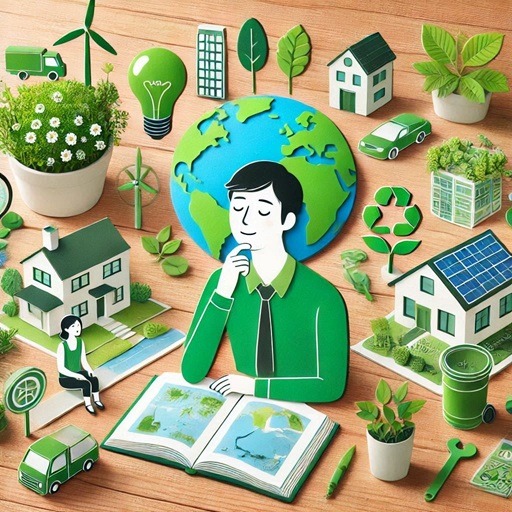Discover practical strategies for sustainable living in 2025. Learn how to transform your daily habits, save money, and protect the environment with our comprehensive green living guide.
Table of Contents
- Understanding Green Living
- Smart Home Solutions
- Sustainable Fashion
- Zero-Waste Kitchen
- Eco-friendly Travel
- Digital Sustainability
- Green Finance
Understanding Green Living
Green living isn’t just a trend – it’s a necessary shift in lifestyle that benefits both the environment and your wallet. Modern sustainable living combines traditional environmental practices with cutting-edge technology to create efficient, eco-friendly solutions.
Key Benefits
- Reduced Utility Bills: Save money by adopting energy-efficient practices and technologies.
- Improved Health Outcomes: Enjoy cleaner air, reduced exposure to toxins, and fresher food.
- Increased Property Value: Eco-friendly homes are more attractive to buyers and have higher market values.
- Lower Environmental Impact: Reduce your carbon footprint and contribute to a healthier planet.
- Enhanced Quality of Life: Sustainable living fosters a sense of purpose and well-being.
Smart Home Solutions
Modern smart home technology makes it easier than ever to adopt sustainable practices.
Energy Management
Take control of your home’s energy usage with:
- AI-powered Thermostats: Automatically optimize your heating and cooling.
- Solar-integrated Roofing: Harness renewable energy to power your home.
- Smart Appliance Networks: Manage and monitor devices efficiently.
- Energy Monitoring Systems: Track your usage in real-time.
- Automated Lighting Controls: Reduce energy waste with motion-sensor lights.
Water Conservation
Preserve water resources with innovative technologies:
- Greywater Recycling Systems: Reuse water from sinks and showers for irrigation.
- Smart Irrigation: Water your garden only when needed.
- Leak Detection Systems: Prevent water waste from unnoticed leaks.
- Water Usage Monitoring: Gain insights into your daily consumption.
- Rainwater Harvesting: Collect and use rainwater for household needs.
Sustainable Fashion
Transform your wardrobe into a beacon of sustainability without compromising style.
Circular Fashion
Minimize waste and maximize usability with:
- Capsule Wardrobe Planning: Focus on versatile, timeless pieces.
- Clothing Rental Services: Rent outfits for special occasions instead of buying.
- Repair and Upcycling: Extend the life of your clothing by fixing or repurposing.
- Sustainable Fabric Choices: Opt for organic or recycled materials.
- Second-hand Shopping: Find unique, affordable pieces in thrift stores.
Ethical Production
Support brands committed to responsible practices:
- Fair Trade Certification: Ensure fair wages and safe working conditions.
- Local Production: Reduce emissions by buying locally made goods.
- Transparent Supply Chains: Know where and how your clothes are made.
- Recyclable Materials: Choose products designed to be recycled.
- Biodegradable Packaging: Avoid plastic waste with eco-friendly alternatives.
Zero-Waste Kitchen
Create a kitchen that prioritizes sustainability and efficiency.
Food Management
Cut down on food waste with:
- Meal Planning Apps: Avoid overbuying by planning meals in advance.
- Composting Systems: Turn food scraps into nutrient-rich compost.
- Bulk Buying Stations: Reduce packaging waste by purchasing in bulk.
- Food Preservation Techniques: Extend the life of perishables with freezing or canning.
- Waste Tracking Tools: Monitor and minimize your kitchen’s waste output.
Sustainable Equipment
Invest in eco-friendly kitchen tools and appliances:
- Energy-efficient Appliances: Save energy with modern, low-consumption devices.
- Plastic-free Storage: Use glass, metal, or silicone containers.
- Reusable Containers: Replace single-use plastics with durable alternatives.
- Biodegradable Cleaning Products: Protect waterways with natural cleaners.
- Multi-purpose Gadgets: Reduce clutter and waste with versatile tools.
Eco-friendly Travel
Travel responsibly without sacrificing adventure.
Transportation Choices
Reduce your travel footprint by:
- Electric Vehicle Sharing: Access EVs without owning one.
- Integrated Public Transport: Use efficient, interconnected transit systems.
- Carbon Offset Programs: Compensate for emissions by supporting green projects.
- Bicycle Infrastructure: Explore cities on two wheels.
- Walking-friendly Communities: Enjoy pedestrian-friendly areas.
Vacation Planning
Plan trips with sustainability in mind:
- Eco-tourism Destinations: Visit places that prioritize conservation.
- Local Experiences: Support local economies by engaging with communities.
- Sustainable Accommodations: Stay in hotels that follow eco-friendly practices.
- Digital Travel Documents: Go paperless with digital tickets and itineraries.
- Responsible Tour Operators: Choose agencies committed to sustainability.
Digital Sustainability
Embrace eco-conscious habits in the digital space.
Tech Habits
Optimize technology use to lower energy consumption:
- Cloud Computing Optimization: Store and process data efficiently.
- Energy-efficient Devices: Select gadgets with lower power consumption.
- Digital Decluttering: Free up storage to reduce energy demand.
- Green Web Hosting: Support providers that use renewable energy.
- E-waste Management: Properly recycle outdated electronics.
Online Practices
Adopt sustainable online behaviors:
- Email Cleanup Routines: Delete old emails to reduce server energy use.
- Video Streaming Optimization: Lower resolution to save bandwidth.
- Data Center Selection: Use providers with sustainable practices.
- Digital Minimalism: Reduce screen time and app usage.
- Sustainable Search Engines: Switch to eco-friendly search platforms.
Green Finance
Align your financial decisions with your environmental values.
Sustainable Investments
Grow your wealth while supporting the planet:
- Green Bonds: Fund projects that focus on renewable energy or conservation.
- ESG Investments: Invest in companies with strong environmental, social, and governance practices.
- Renewable Energy Stocks: Back the future of clean energy.
- Sustainable Mutual Funds: Diversify your portfolio with eco-friendly options.
- Carbon Credit Trading: Support initiatives that offset emissions.
Daily Banking
Incorporate sustainability into everyday transactions:
- Digital Banking: Reduce paper waste with online banking services.
- Paperless Statements: Go green with electronic records.
- Green Credit Cards: Use cards that support environmental projects.
- Ethical Banking Options: Choose institutions that prioritize sustainability.
- Sustainable Insurance: Insure with companies that invest in green initiatives.
Conclusion
Green living in 2025 combines environmental consciousness with modern convenience. By implementing these strategies, you can create a sustainable lifestyle that benefits both your community and the planet. Start with small changes and gradually transform your daily habits into sustainable practices.







Leave a Reply